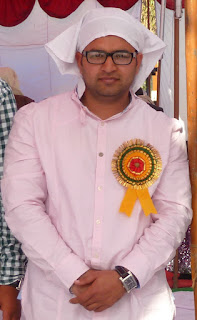 Today (October 29) is the centenary of ‘Peoples Poet’ Gurdas
Ram Alam (1912-1989), was a genius but an embodiment of simplicity and
humility. His bio-profile is nothing but poetry of total transformation in the
society. I am not a literary critique and may not know the nuances of fine
poetry. But the poetry of Alam, to a layman like me, is the language of the
poor. It is the spirit of the down-trodden. It speaks of equality. It pleads for
a just and equitable social and economic order. Alam was not educated in the
formal sense of scholastic classes. He barely learnt the Punjabi language at
home but Alam was a born intellectual. His poetry amply confirms this. Alam
could easily be compared with Shiv Kumar Balalvi, Pash, Mohan Singh, and Amrita
Pritam, all in one. People termed him a communist when he gave an easy Punjabi
expression to the theory of Marx “to each according to his need and from each
according to his capacity” and wrote “asin bit to waddu dinden han; sanu lod
mutabik milda nahin “. Alam became an Ambedkarite when he recited his poem “ ajj
kaon ayia savere savere “ in a public meeting in the presence of Dr. B.R.
Ambedkar in 1952 at Bootan Mandi in Jalandhar.
He wrote about Guru Ravidass in his poem ‘Inqalabi Aaggu’. Alam wrote
about Guru Nanak in his poem ‘Patni da Gilla’. He wrote about contemporary
politics. Alam gave an altogether new idiom to romance and love when he wrote “mahi
mera kale rang da behde badda ta chand chad janda “. Alam did not know any boundary and practiced the
art of poetry for the common good of the society without any dogma of theory
and ideology as a universal humanist.
Today (October 29) is the centenary of ‘Peoples Poet’ Gurdas
Ram Alam (1912-1989), was a genius but an embodiment of simplicity and
humility. His bio-profile is nothing but poetry of total transformation in the
society. I am not a literary critique and may not know the nuances of fine
poetry. But the poetry of Alam, to a layman like me, is the language of the
poor. It is the spirit of the down-trodden. It speaks of equality. It pleads for
a just and equitable social and economic order. Alam was not educated in the
formal sense of scholastic classes. He barely learnt the Punjabi language at
home but Alam was a born intellectual. His poetry amply confirms this. Alam
could easily be compared with Shiv Kumar Balalvi, Pash, Mohan Singh, and Amrita
Pritam, all in one. People termed him a communist when he gave an easy Punjabi
expression to the theory of Marx “to each according to his need and from each
according to his capacity” and wrote “asin bit to waddu dinden han; sanu lod
mutabik milda nahin “. Alam became an Ambedkarite when he recited his poem “ ajj
kaon ayia savere savere “ in a public meeting in the presence of Dr. B.R.
Ambedkar in 1952 at Bootan Mandi in Jalandhar.
He wrote about Guru Ravidass in his poem ‘Inqalabi Aaggu’. Alam wrote
about Guru Nanak in his poem ‘Patni da Gilla’. He wrote about contemporary
politics. Alam gave an altogether new idiom to romance and love when he wrote “mahi
mera kale rang da behde badda ta chand chad janda “. Alam did not know any boundary and practiced the
art of poetry for the common good of the society without any dogma of theory
and ideology as a universal humanist.
I am fortunate that I met Alam and listened to his poetry
from his mouth way back for several years in late 60s in Kavi Darbars in Bootan
Mandi in Jalandhar on the Gurupurab of Guru Ravidass. Later I read his poetry
books and carried them with me abroad in course of my diplomatic assignments.
His poetry is as relevant today as it was before. In recent years, I heard lot
about Alam in Glasgow in Scotland when I was the Consul General of India in
Edinburgh. He enthralled the audiences in Glasgow when he visited there with Shiv
Kumar Batalvi. My admiration for Alam goes higher and higher as the years go
by.
My senior colleague
Ambassador Bal Anand prompted me to participate in a function to commemorate
Gurdass Ram Alam on October 28 at Jalandhar by Manavwadi Rachna Manch. It was a
rewarding attendance. It provided me an opportunity to listen to intellectual
poets and scholars who spoke high of Alam and rightly so. The Manch conferred “Gurdass
Ram Alam Award” on a recognized poet of Alam's genre, Madan Veera. The function
succeeded in paying well deserved tributes to Gurdass Ram Alam on his
centenary. Alam and his poetry will remain alive in the years to come.


